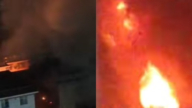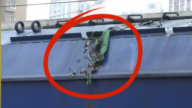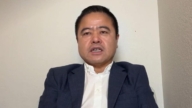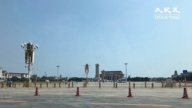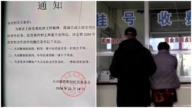【新唐人2013年03月02日讯】严重急性呼吸综合症(Severe Acute Respiratory Syndrome,SARS)—— 萨斯,中国大陆称为“非典”。10年前,中国大陆有5327人感染“非典”、349人死亡。这场严重的公共卫生危机改变了许多人的命运。当年因揭露萨斯病而遭到中共当局软禁的蒋彦永医生也是其中一位。他在“SARS十周年纪念座谈会”上再度强调:真话的重要性。另外,大陆媒体刊登有关萨斯危机发生十周年的长篇报导。报导认为,当年萨斯病的发生,对中共政府重大信息披露起到了重大促进作用。然而有评论指出,表面上,中共是有一套重大讯息披露程序,但实际上还要看领导的意图行事。
28号,在北京局行的“SARS十周年纪念座谈会”,有20多名医学人员、萨斯病患和媒体人士出席。因揭露北京萨斯疫情而遭中共软禁的老军医蒋彦永,也出席座谈会。82岁高龄的他强调:讲真话最重要,讲真话并不困难,也不要怕讲错。
据报导,参与座谈的还有《中国青年报》图片总监贺延光,他回忆当年萨斯疫情爆发时的经过,他说,“2月就听说了,4月20号以后才能有报导。我们媒体太听话了!”他还表示,10年过去了,有些事还不能讲。
中国大陆网路作家荆楚:“西方的媒体,以揭露社会的丑陋阴暗的事情为职责。中国的媒体,就是报喜不报忧,丧事当成喜事办。老百姓生不如死了,他媒体上是到处莺歌燕舞,形势一片大好,不是小好,而是越来越好。这就起了一个蒙蔽、麻醉国人的作用。”
而大陆最新一期的《中国新闻周刊》,也刊登有关萨斯危机发生十周年的长篇报导。作者认为,当年萨斯病的发生,对中国政府重大信息披露起到了“重大促进作用,成为中国公共卫生史上的一个转捩点和里程碑。”
深圳独立学者朱建国在接受《自由亚洲电台》访问时表示,他本人并没有看到中共政府在重大信息披露方面,因为萨斯病而有所进步。
深圳独立学者朱建国:“我看到今天有一条消息报了,广东有一个地方出现了口蹄疫。现在已经非常严重了,但是在事前,在苗头状态的时候一点消息都没有。就像当年的非典(即萨斯病)一样,最初他们(中共)也是没有披露,到最后已经不可隐瞒的时后,才披露。习近平虽然说政府要多听听批评,但是我们看到的实际:评论和批评的版面却越来越少。”
时政评论家蓝述则向《新唐人》表示,中共官员之间关系盘根错节,官员说真话,将牵一发而动全身。
时政评论家蓝述:“中共的官员上下互相之间,有一种提拔的关系,所以说这个关系盘根错节,牵一发而动全身,所以他要说真话的时候,他要考虑还会影响到谁,提拔他的人和被他提拔的人,所以他会考虑很大的一个问题,所以最后就是啥都不说了。”
蓝述还表示,所谓的讯息披露的进步,还是拜互联网所赐。
蓝述:“是因为互联网的迅速发展,所以有很多事情它(中共)瞒不住了,那瞒不住的话就只有公开了,那么,对于一些直接威胁到中共的政权稳定的重大的消息,它是绝对不报导的。”
朱建国也认为,在重大信息披露方面,中国只是制定了一批看上去很好看的披露程序,但实际上还要看领导的意图行事。
朱建国:“主要领导他开口了,你才能够弄(披露重大信息)。那个程序都是假的,是空的。这就像中国的宪法和法律不知道(制定)有多少,但是实际上呢?”
中国工程院院士钟南山,也是抗击萨斯的旗帜性人物。日前他在接受媒体采访时也表示,目前应对突发公共卫生事件,最突出的问题就是疾病信息的覆盖和上报。他说:“个别地区上报的病例数和死亡人数不够准确,这与某些地方官员担心这些数字会影响自己的政绩有关。”
采访/刘惠 编辑/黄亿美 后制/郭敬
Any Progress on Information Disclosure?
Severe Acute Respiratory Syndrome, (SARS), was called
‘atypical pneumonia’ in mainland China.
10 years ago, (Chinese media) reported 5,327 people infected
with SARS in mainland China and 349 people died.
This serious public health crisis has changed the
fate of many people.
Dr. Jiang Yanyong, who exposed the SARS epidemic, was under
house arrest by the Chinese Communist Party (CCP).
He once again stressed during the SARS 10th anniversary
symposium the importance of telling the truth.
In addition, the mainland media published lengthy reports
about the SARS epidemic tenth anniversary.
The report said that when SARS occurred, it played a significant
role in promoting disclosure of major information to the CCP.
However, it was said that, on the surface, the CCP has a set of
information disclosure procedures.
In reality it acts according to the leadership’s intent.
On February 28th the SARS 10th anniversary symposium
was held in Beijing.
More than 20 medical personnel, SARS patients,
and the media were invited to attend.
Jiang Yanyong was also invited under house arrest due to
exposing SARS.
Jiang, aged 82, stressed that “It is most important to tell the truth,
but not difficult, do not be afraid to say anything wrong.”
According to reports, He Yanguang, the director of photos
of the China Youth Daily also attended.
He recalled the process of the outbreak of the SARS epidemic.
He said," We heard in February, but were only allowed
to report on April 20th. We media were too obedient,"
He also said that, 10 years later, some things still cannot
be spoken out loud.
Internet writer Jing Chu: “Western media duties
are to expose the ugly dark things in the society.
But media in China reported nothing but good news,
and even handle a funeral as a happy event.
The people felt better to die rather than to live.
The (CCP) media were full of the joy of spring saying the
situation is excellent, not trivial, but getting better and better.
This played a role to blind and anesthetize the people."
The latest issue of Newsweek in mainland China also published
lengthy reports about the SARS crisis tenth anniversary.
The authors suggested that when SARS occurred, it played a
“significant role in promoting disclosure of information to the CCP,
becoming a turning point and milestone in the history
of public health.”
Independent scholar Zhu Jianguo in Shenzhen
was interviewed by Radio Free Asia.
He said he did not see any progress of the CCP in the
disclosure of major information because of SARS.
Zhu Jianguo: “I read in the newspaper that in Guangdong
there were foot-and-mouth disease outbreaks.
Although it was reported, the epidemic is now very serious.
There was no information disclosure of the epidemic when
it just appeared. Just as SARS, it was not disclosed initially.
When the development of the epidemic couldn’t be concealed,
the CCP only then disclosed it to the public.
Xi Jinping said the Government should listen more to criticism,
actually see the forums of comment and criticism become fewer."
Political critic Lan Shu told NTD television that there are deep-
rooted relations between the CCP officials;
if officials spoke the truth, it will indeed affect them all.
Lan Shu: “There is a promotion relationship between
the CCP officials of different levels.
This makes the relationship become deeply rooted.
It indeed affects the whole body, if one tells the truth.
So he will have to consider whom will be affected among
those who promoted him and whom he promoted.
He will be considered a big problem,
so consequently he said nothing in the end."
Lan Shu also said that the so-called progress of message
disclosure is thanks to the Internet.
Lan Shu: “Since the internet developed, a lot of things could
not be concealed by the (CCP), then it had to disclose them.
But for some news having a direct threat to the stability of
the CCP regime, it is will never report it.”(Voice from RFA)
Zhu Jianguo also believes that in the disclosure of
major information,
China just developed a disclosure program which
looks very nice, but depends on leadership intending to act.
Zhu Jianguo: “If principal leaders did not allow it,
nobody dared to disclose major information.
The information disclosure procedures developed are
false and inane.
It’s like the Chinese Constitution and relevant laws
are enacted well, but how they were actually carried out?"
Zhong Nanshan, an academic of China Academy of Engineering,
was also a public figure in the movement against SARS.
In a recent media interview, he also said currently to respond to
public health emergencies, the most prominent problem is the coverage and reporting of disease information.
He said, the reported number of cases and deaths
in some regions were not accurate enough.
“It is related to some local officials worried that these figures
will affect their own achievements.”




